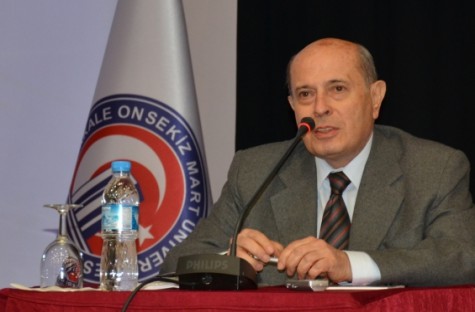
Ömer Engin LÜTEM
R. Ambassador
Alongside its normal legislation duties, the US Senate also passes resolutions in order to express views on certain matters. Although they are not legally binding, these resolutions play an important role in influencing public opinion because they reflect the position of the Senate or the House of Representatives.
American citizens of Armenian and Greek descent attempt gain support for their negative approaches to some issues and certain demands by passing resolutions in the Congress. Turkey is thus forced to expend a great deal of effort in order to prevent the passing of such resolutions.
Among these resolutions, the one that discomforts Turkey the most is the one that claims that there was an Armenian genocide and that this must recognized by the Congress and the American President. For the last twelve years draft resolutions of this nature have been sent to every House of Representatives (its members are elected every two years) and sometimes to the Senate. Two of such resolutions were adopted by commissions and brought to the House of Representatives, but were stopped with the direct or indirect intervention of American presidents (Bill Clinton and George W. Bush) before they could be voted on. Members of Congress who espouse Armenian views, however, have continued to present such draft resolutions.
The most recent resolution; the H.ReS.227 submitted to the House on May 20, 2013, requests that the US President works toward establishing equitable, constructive, stable, and durable relations between Turkey and Armenia; but indicates that the basis for such relations will be for Turkey to recognize the Armenian genocide allegations and its consequences. The resolution, which found only 50 cosponsors in the 435-member House of Representatives, has remained in the Foreign Affairs Committee for nearly a year now without being put on the agenda.
Due to the fact that this resolution is unlikely to be passed in the House of Representatives, a resolution with the same topic was submitted to the Senate on the 3rd of April by Head of Foreign Affairs Committee Senator Robert Menendez, a long time espouser of Armenian views. This resolution contains statements that are more adverse than the resolution submitted to the House of Representatives, and contain some historical claims like that the Armenian genocide which allegedly took place between 1915 and 1923, that 1.5 million people were killed, that 500,000 people were exiled, and that the 2500 year presence of Armenians was ended in their historical homeland. Alongside such claims, the resolution contains more current criticisms such as that the Turkish government had the monument in Kars representing peace with Armenia demolished in 2011, and also that it was preventing the development of relations between the two countries by continuing to deny the genocide.
The following points are contained in the operative part of the resolution:
"(1) to remember and observe the anniversary of the Armenian Genocide on April 24, 2014."
"(2) that the President should work toward an equitable, constructive, stable, and durable Armenian-Turkish relationship that includes the full acknowledgment by the Government of the Republic of Turkey of the facts about the Armenian Genocide; and"
"(3) that the President should ensure that the foreign policy of the United States reflects appropriate understanding and sensitivity concerning issues related to human rights, crimes against humanity, ethnic cleansing, and genocide documented in the United States record relating to the Armenian Genocide."
Apart from the last point about American foreign policy giving more importance the issues of genocide and crimes against humanity, the first two points are directly related to the claims of Armenian genocide. These two points are about the upcoming April 24 commemoration ceremonies in the US, and also tie the establishment of relations between Turkey and Armenia with Turkey’s recognition of the genocide claims and its consequences.
Is there a possibility that his draft resolution will be passed? The fact that Robert Menendez is the Head of the Foreign Affairs Committee makes one think that the draft resolution has a chance of being accepted by this Committee. However, what will happen in the general assembly of the Senate, which is the next phase, is difficult to predict.
Since the draft resolution requests the commemoration of the so-called Armenian genocide on April 24 of this year, it is expected that the draft resolution will be voted on within the next two weeks.
© 2009-2025 Center for Eurasian Studies (AVİM) All Rights Reserved
No comments yet.
-
BULGARIA’S REQUEST FOR COMPENSATION (II)
Ömer Engin LÜTEM 07.01.2010 -
THE FAIRYTALES OF BOGHOS
Ömer Engin LÜTEM 25.06.2014 -
THE ARMENIAN LAW AND THE FRENCH CONSTITUTIONAL COURT
Ömer Engin LÜTEM 01.02.2012 -
SARKISIAN’S INVITATION
Ömer Engin LÜTEM 05.06.2014 -
FRANCE-TURKEY: PERPETUAL CRISIS (II)
Ömer Engin LÜTEM 20.12.2011
-
THE PROTOCOLS: A RETURN TO THE BEGINNING
Ömer Engin LÜTEM 20.01.2010 -
 A MESSAGE OF CONDOLENCE FROM AVİM
A MESSAGE OF CONDOLENCE FROM AVİM
Özge 07.10.2014 -
 UNDERSTANDING NAGORNO-KARABAKH DESPITE THE BIASED MANNER OF THE WESTERN MEDIA
UNDERSTANDING NAGORNO-KARABAKH DESPITE THE BIASED MANNER OF THE WESTERN MEDIA
Tutku DİLAVER 21.01.2021 -
 NOT MERELY XENOPHOBIA, BUT ACTS FOR OVERSHADOWING THE SERIOUSNESS OF THE HOLOCAUST IS INCREASING AS WELL
NOT MERELY XENOPHOBIA, BUT ACTS FOR OVERSHADOWING THE SERIOUSNESS OF THE HOLOCAUST IS INCREASING AS WELL
Hazel ÇAĞAN ELBİR 16.07.2019 -
 GREEK INDEPENDENCE DAY AND THE PREVAILING DOUBLE STANDARD OF THE WEST
GREEK INDEPENDENCE DAY AND THE PREVAILING DOUBLE STANDARD OF THE WEST
AVİM 16.04.2025
-
25.01.2016
THE ARMENIAN QUESTION - BASIC KNOWLEDGE AND DOCUMENTATION -
12.06.2024
THE TRUTH WILL OUT -
27.03.2023
RADİKAL ERMENİ UNSURLARCA GERÇEKLEŞTİRİLEN MEZALİMLER VE VANDALİZM -
17.03.2023
PATRIOTISM PERVERTED -
23.02.2023
MEN ARE LIKE THAT -
03.02.2023
BAKÜ-TİFLİS-CEYHAN BORU HATTININ YAŞANAN TARİHİ -
16.12.2022
INTERNATIONAL SCHOLARS ON THE EVENTS OF 1915 -
07.12.2022
FAKE PHOTOS AND THE ARMENIAN PROPAGANDA -
07.12.2022
ERMENİ PROPAGANDASI VE SAHTE RESİMLER -
01.01.2022
A Letter From Japan - Strategically Mum: The Silence of the Armenians -
01.01.2022
Japonya'dan Bir Mektup - Stratejik Suskunluk: Ermenilerin Sessizliği -
03.06.2020
Anastas Mikoyan: Confessions of an Armenian Bolshevik -
08.04.2020
Sovyet Sonrası Ukrayna’da Devlet, Toplum ve Siyaset - Değişen Dinamikler, Dönüşen Kimlikler -
12.06.2018
Ermeni Sorunuyla İlgili İngiliz Belgeleri (1912-1923) - British Documents on Armenian Question (1912-1923) -
02.12.2016
Turkish-Russian Academics: A Historical Study on the Caucasus -
01.07.2016
Gürcistan'daki Müslüman Topluluklar: Azınlık Hakları, Kimlik, Siyaset -
10.03.2016
Armenian Diaspora: Diaspora, State and the Imagination of the Republic of Armenia -
24.01.2016
ERMENİ SORUNU - TEMEL BİLGİ VE BELGELER (2. BASKI)
-
AVİM Conference Hall 24.01.2023
CONFERENCE TITLED “HUNGARY’S PERSPECTIVES ON THE TURKIC WORLD"









